Nutrition (BS)
Help others achieve personal health and wellness goals.
- Available as
- Major
- Degrees/Options
- Bachelor of Science
- Length
- 4 years
- Locations
- Fort Wayne
- Concentrations
- Health Promotion
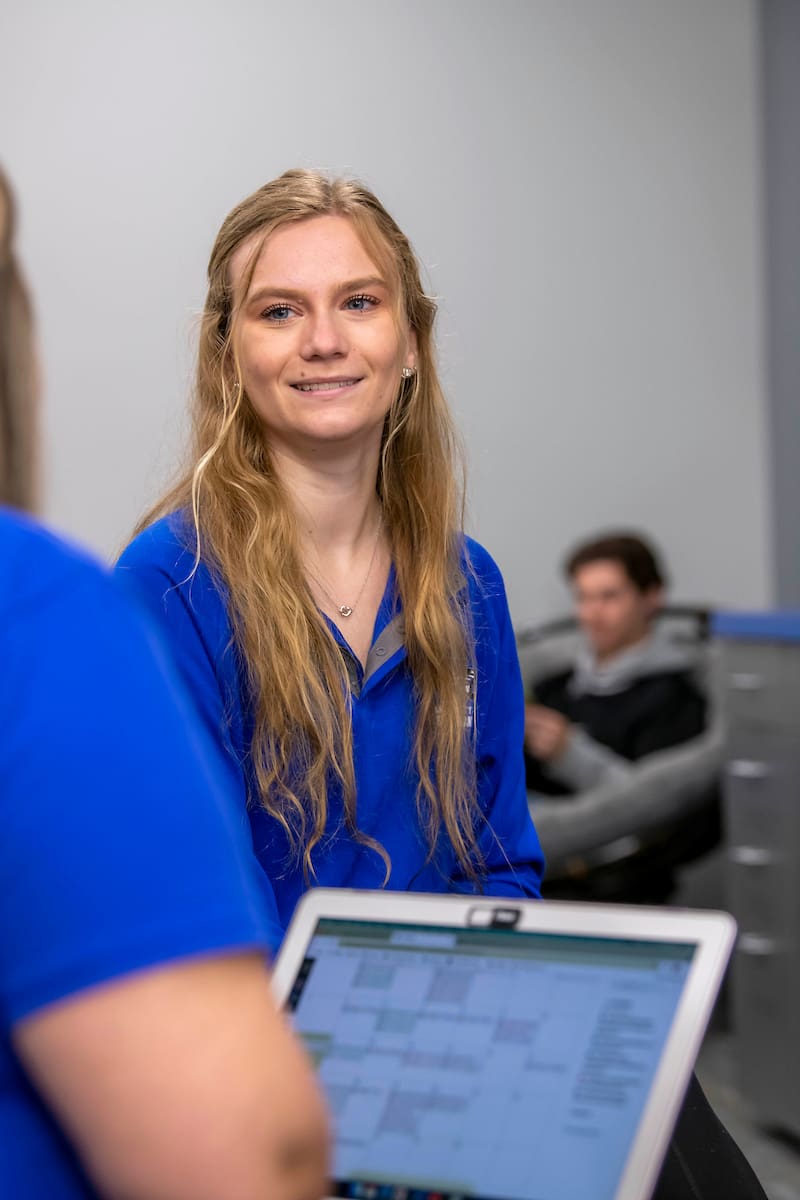
Why Study Nutrition Science?
What we eat has a profound impact on our health. Rising rates of diabetes, heart disease and cancer, among other conditions, illustrate the critical role nutrition plays in improving our health outcomes.
Pursuing a degree in Nutrition fulfills your calling to help people in one of the most meaningful ways possible: by improving their quality of life and extending their time with loved ones. This field offers a range of professional possibilities, from food marketing and health education to becoming a registered dietitian.
How to Become a Registered Dietitian
Requirements for the Registered Dietitian Nutritionist (RDN) have changed. As of January 2024, a master’s degree is required to take the Commission on Dietetic Registration exam. Saint Francis is no longer accepting students into its Coordinated Program for Dietetics.
However, our B.S. in Nutrition is a great starting point for an RDN career. It will prepare you for admission and success in graduate school. In addition, our team of faculty experts will guide and support your graduate program search.
7%
Expected demand for dietitians and nutritionists through 2031
BLS.gov
$66,450
National median salary for dietitian and nutritionists in 2021
BLS.gov
Why Saint Francis for Nutrition?
When you study nutrition science at Saint Francis, you’ll benefit from small classes, an experienced, readily available faculty and a program that deeply connects with our university’s Franciscan values. Not only will you leave with the knowledge and skills to succeed in the field, but you will also bring to your career a reverence for the dignity of each unique client you’ll serve.
Health Promotion
Gain a solid foundation in nutritional biochemistry and an understanding of how to apply nutrition for disease prevention; then use that knowledge to create educational and intervention programs for people of all ages, backgrounds and stages of life.
Be Taught by Experts
As a student in our Nutrition program, you will be taught by true experts—clinicians who work in the field and share the value of their professional experience. They know what’s current in the industry and how to transition into the “real world.” Plus, they really, really care about your success!
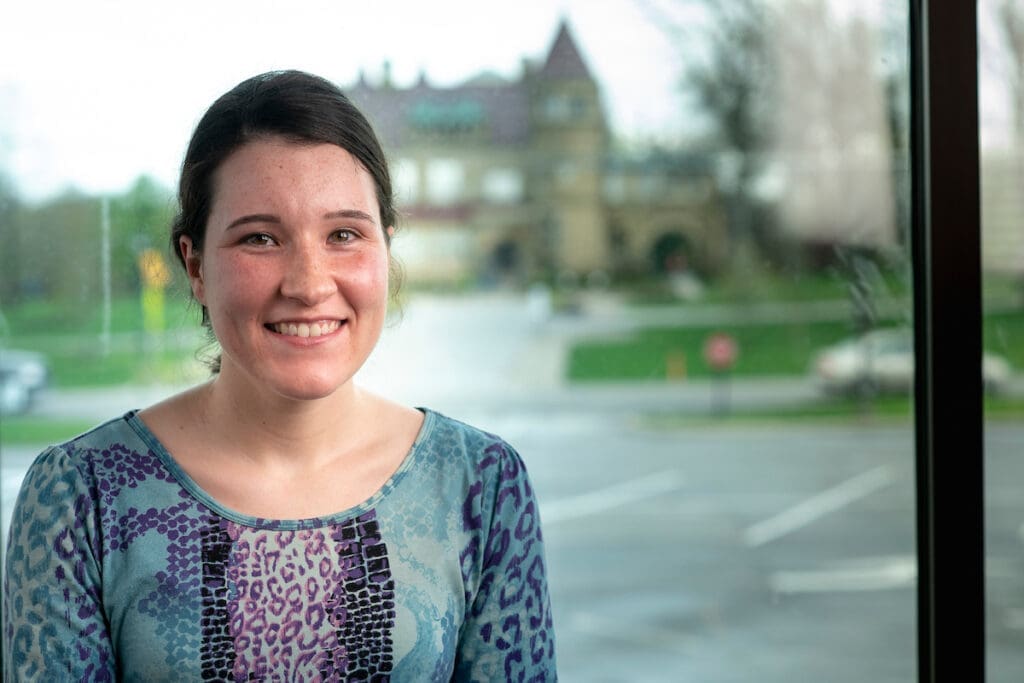
“I truly feel that if I went to any other college in the state, I wouldn’t have gotten the same level of experience as I did at Saint Francis. I think it boils down to the professors, the care they give, the professional opportunities and the Christian atmosphere.”
Kelsie Winebrenner ’19 Inpatient Dietician at DaVita Dialysis
“The professors are one of the best things about this program. They are so engaged with students and they really want us to succeed. I can always approach them for help if I don’t understand something; they always take the time to clarify it or work through it again.”
Melissa Fearnow ’20 Coordinated Program in Dietetics
Hands-On Learning
Nutrition is an art and science, and you’ll see both come alive as you explore the chemistry of foods or modify a recipe for a health condition. The Saint Francis Food Lab—modeled after a commercial food service kitchen—gives you a space to build skills and confidence.
Internships and service-learning add to the mix of your hands-on learning at Saint Francis. As a Nutrition: Health Promotion student, you’ll work with community partners on real-world nutrition education projects. You’ll also find activity- and project-based elements in most of your coursework.
Campus and Community
Nutrition majors can join their peers in KAN (the Kinesiology and Nutrition Club). With a focus on career development and community connections, members create awareness projects, attend networking events and host monthly meetings.
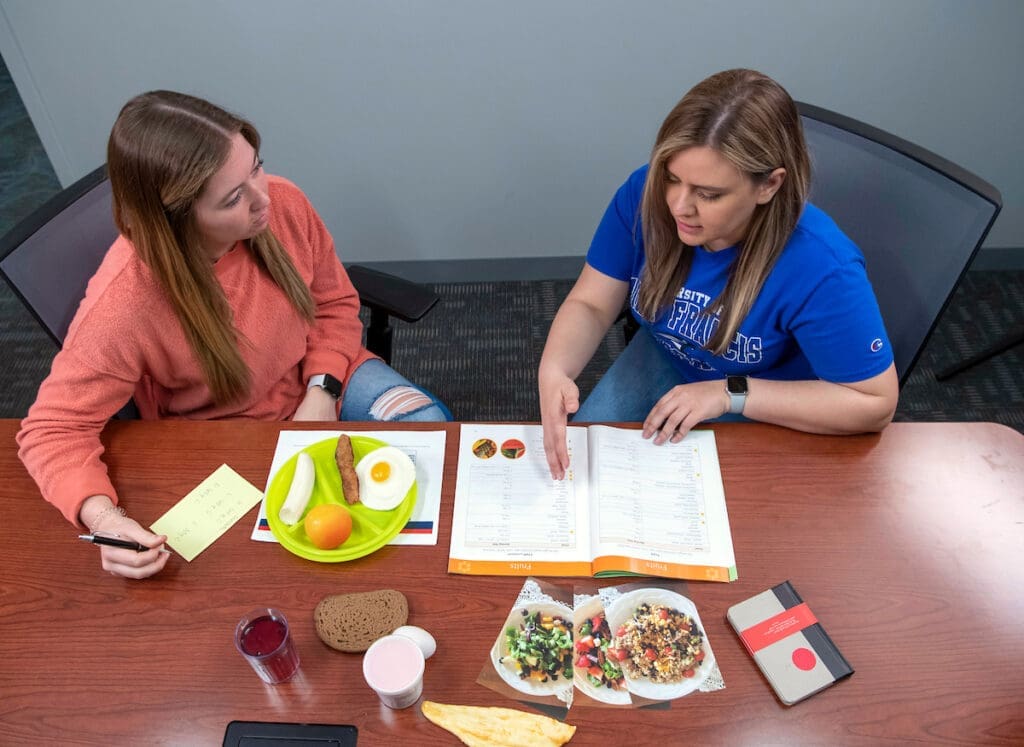

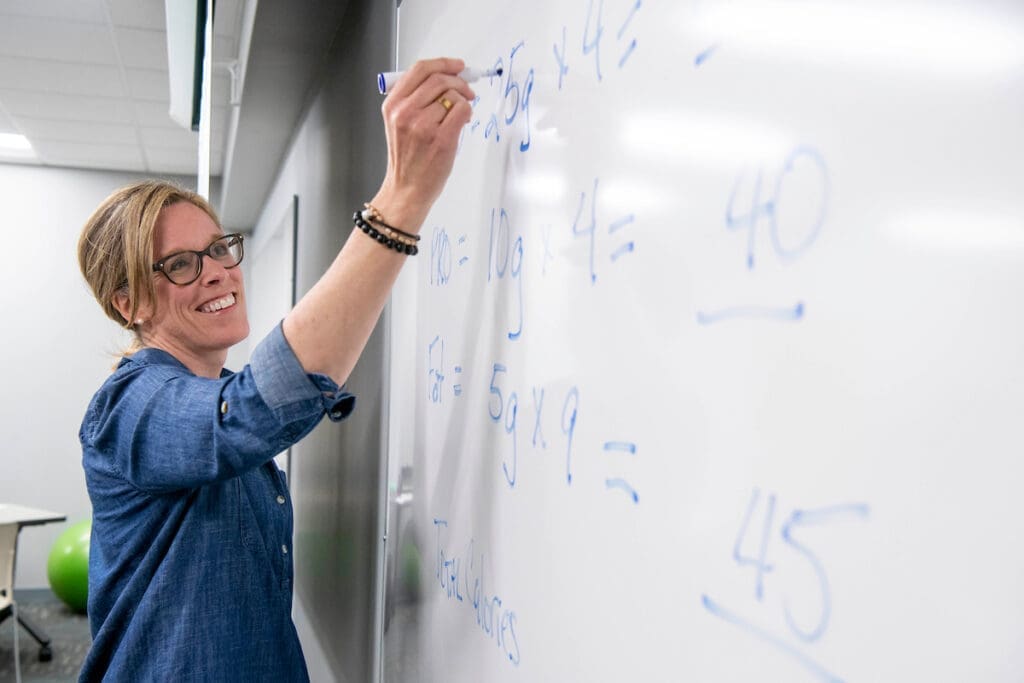
Health Promotion Careers
Along with laying the groundwork for a career as an RDN, our program will prepare for a range of human health and nutrition positions in a variety of settings:
- Health education/performance nutrition
- Community outreach
- Health communications
- Food marketing
- Human services agencies
- Government health agencies
- Food service management
- Private consulting
Where You’ll Find Our Graduates
Saint Francis graduates have started their careers at the following sites:
- Appalachian Regional Healthcare
- Body by Kate
- DaVita Dialysis
- Lutheran Health Network
- Nourish Health Center
- Parkview Health
- Women’s, Infants’ and Children’s Clinics
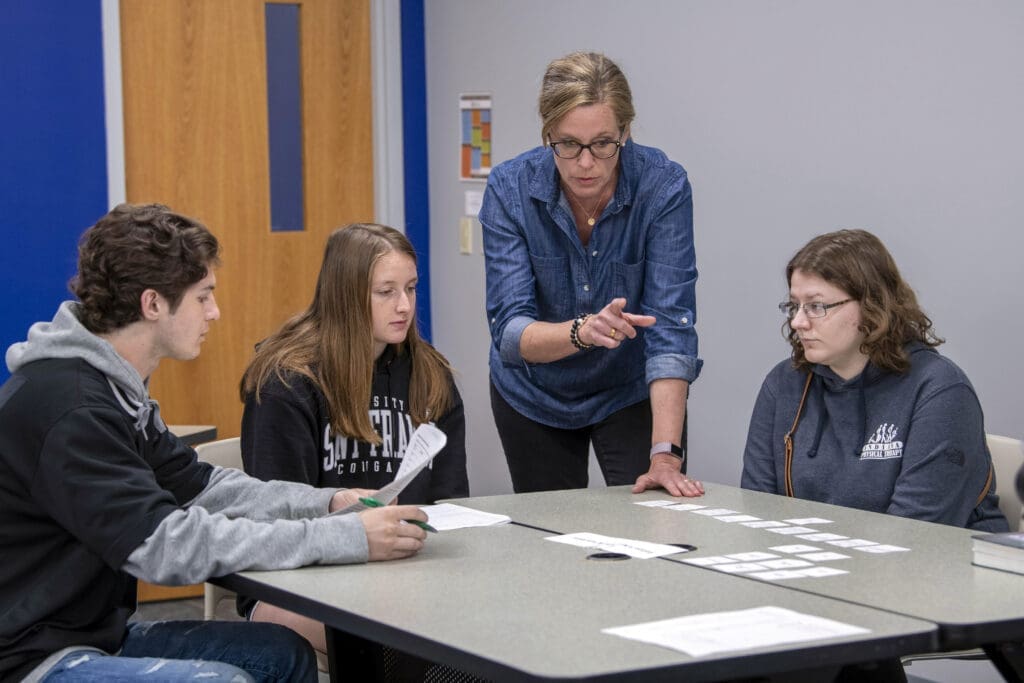
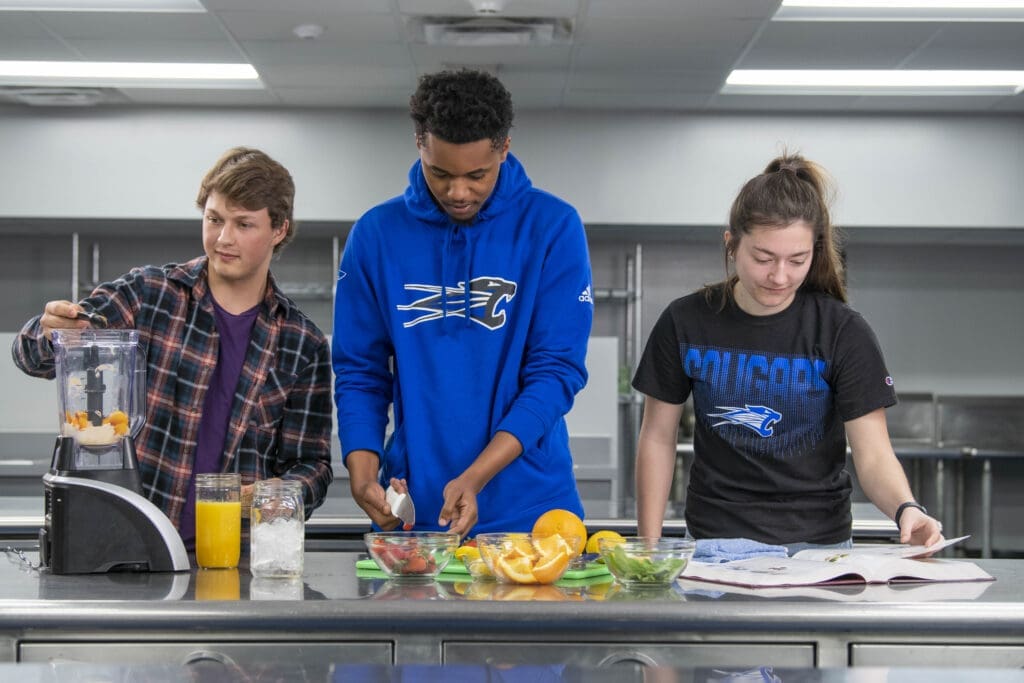
Accreditation
The University of Saint Francis’ Coordinated Program in Dietetics is fully accredited by the Accreditation Council on Education in Nutrition and Dietetics (ACEND), the accrediting body of the Academy of Nutrition and Dietetics. This is granted at the baccalaureate level for a maximum enrollment of seven first-year and seven second-year students with a concentration in Health Promotion.
120 South Riverside Plaza
Suite 2190
Chicago, IL 60606-6995
800-877-1600, ext. 5400
For more information about ACEND, visit http://www.eatright.org/ACEND/. For more information about the AND, visit http://www.eatright.org/.
Program Goals and Objectives
Goal 1: The Coordinated Program in Dietetics at Saint Francis will prepare graduates to be competent entry-level dietitians.
Program Objectives for Goal 1:
- At least 80% of program students complete program/degree requirements within 3 years (150% of the program length).
- 80% of program graduates take the CDR credentialing exam for dietitian nutritionists within 12 months of program completion.
- The program’s one-year pass rate (graduates who pass the registration exam within one year of the first attempt) on the CDR credentialing exam for dietitian nutritionists is at least 80%.
- Of graduates who seek employment, 70% are employed in nutrition and dietetics or related fields within 12 months of graduation.
- 70% or more of program graduates will be rated as satisfactory by employers.
- At a one-year post-graduation survey, 80% of the graduates who respond to the survey will indicate adequate preparation to practice effectively as an entry-level dietitian nutritionist.
Goal 2: The Coordinated Program in Dietetics at Saint Francis will prepare graduates to be life-long learners and encourage ongoing professional development.
Program Objectives for Goal 2:
- 70% of graduates will have their Professional Development Portfolio Plan submitted and approved by the Commission on Dietetic Registration (CDR) within 12 months of becoming a Registered Dietitian.
- 50% or more of program graduates will be active in professional organizations and/or community service within 12 months of program completion.
Get the Details —Facts and Info
Saint Francis is committed to the Bachelor of Science in Nutrition: Health Promotion concentration. The Coordinated Program in Dietetics concentration is no longer accepting students. Students interested in pursuing the Commission on Dietetic Registration (CDR) exam will be assisted by the Nutrition Program Director in locating a master-level program that complements our B.S. in Nutrition: Health Promotion concentration.
Additional Resources
Download the CPD Student Handbook.
The University of Saint Francis CPD offers 1,350 hours of supervised practice/role playing/simulations, 125 credit hours of didactic coursework, and 36 credit hours in the Master of Healthcare Administration Program. The practicum experiences are comprised of rotations in: Food Service Management, Clinical Medical Nutrition Therapy, Community Nutrition and a Special Interest area.
The University of Saint Francis CPD includes a Health Promotion Concentration. These core rotations are designed to provide students with in-depth experiences in a diverse array of dietetic environments including hospitals, long-term care facilities, dialysis centers, school food service organizations, university food service organizations, and community outreach organizations.
| Semester | Bachelor of Nutrition CPD | Master of Healthcare Administration |
| Junior Year | Completion of Bachelor’s didactic coursework. Minimum 12 credit hours. | |
| Summer between Junior and Senior Year | Supervised Practice Food Service Management I and II 504 hours. 9 credit hours. | |
| Senior Fall | Supervised Practice Clinical Medical Nutrition Therapy I and II, 504 hours. | |
| Senior Fall | Medical Nutrition Therapy Seminar, 6 hours of case studies, simulations and role playing. 12 credit hours. | |
| Senior Spring | Supervised Practice Community Nutrition, 168 hours. | |
| Senior Spring | Supervised Practice Special Interest 168 hours. Minimum 12 credit hours. | |
| Post-BS Completion Summer | 12 credit hours | |
| Post-BS Completion Fall | 12 credit hours | |
| Post-BS Completion Spring | 12 credit hours |
Coordinated Program in Dietetics/MHA Completion Requirements
Students have successfully completed the CPD and will be eligible to take the registration examination for dietitians after:
- Completing the 125 undergraduate credit hours.
- Successfully completing a minimum of 1,200 hours of supervised practice experience (USF Program completes 1,350 hours), earning a minimum grade of B or proficient when evaluated by each preceptor at each supervised practice site.
- Complete the MHA 36 credit hours.
- Receiving a Verification Statement of successful completion of the Coordinated Program in Dietetics from the Program Director.
Verification Statement
At completion of the CPD, the Program Director will verify student’s eligibility status with the Commission on Dietetic Registration (CDR), the credentialing agency of the Academy of Nutrition & Dietetics, which will allow qualified candidates to take the Registration Examination for Dietitians. For more information about Verification Statements, visit http://www.eatrightpro.org/resource/acend/program-directors/program-directors-faqs/faqs-about-verification-statements.
Students should meet with the Program Director after all program requirements are completed to provide all the necessary information and signatures required for CDR.
Licensure for Registered Dietitians
Upon passing the Registration Examination for Dietitians, students will be eligible to practice as a registered dietitian. Registered dietitians practicing in the state of Indiana must be Licensed with the State of Indiana; many other states also require licensure or certification. For more information on Certification for Registered Dietitians in the State of Indiana, visit: http://www.in.gov/pla/files/IDCB_2013_Edition.pdf.
Copies of all of the following documents are required to be submitted at the beginning of the CPD:
- Health report
- Health insurance and automobile insurance verification
- Vaccinations: Varicella, MMR, Tetanus, and Hepatitis B vaccinations are required
- TB test; completed no earlier than 4 months prior to supervised practice experiences
- Criminal background check
- Drug testing
- AND membership
- Resume of student to be sent to practicum sites
Coordinated Program in Dietetics Expenses
The student will be responsible for the following expenses:
| Type of Expense | One Time Fee |
| Lab coats and attire for rotations | $100 |
| Name Tag | $10 |
| Physical Exam, Vaccinations and TB test | Variable |
| Criminal background check | $50 through PreCheck |
| Drug screen | $10 through Redi-Med |
| Prep materials for Registration Exam | $400 |
| Application for Registration Exam | $200 |
| Type of Expense | One Time Fee |
| AND Student Membership | $58 |
| Health Insurance | Variable |
| Type of Expense | Semester Fees |
| Tuition & Fees BS CPD | $18,230 |
| Text Books BS CPD | $250 |
| Housing on campus | $5,945 |
| Travel and Auto Insurance | Variable |
| Tuition and Fees for MHA | $7,665 |
